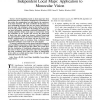Free Online Productivity Tools
i2Speak
i2Symbol
i2OCR
iTex2Img
iWeb2Print
iWeb2Shot
i2Type
iPdf2Split
iPdf2Merge
i2Bopomofo
i2Arabic
i2Style
i2Image
i2PDF
iLatex2Rtf
Sci2ools
TROB
2008
2008
Large-Scale SLAM Building Conditionally Independent Local Maps: Application to Monocular Vision
SLAM algorithms based on local maps have been demonstrated to be well suited for mapping large environments as they reduce the computational cost and improve the consistency of the final estimation. The main contribution of this paper is a novel submapping technique that does not require independence between maps. The technique is based on the intrinsic structure of the SLAM problem which allows the building of submaps that can share information, remaining conditionally independent. The resulting algorithm obtains local maps in constant time during the exploration of new terrain, and recovers the global map in linear time after simple loop closures, without introducing any approximations besides the inherent EKF linearizations. The memory requirements are also linear with the size of the map. As the algorithm works in covariance form, well-known data association techniques can be used in the usual manner. We present experimental results using a hand-held monocular camera, building a ma...
| Added | 28 Jan 2011 |
| Updated | 28 Jan 2011 |
| Type | Journal |
| Year | 2008 |
| Where | TROB |
| Authors | Pedro Pinies, Juan D. Tardós |
Comments (0)

